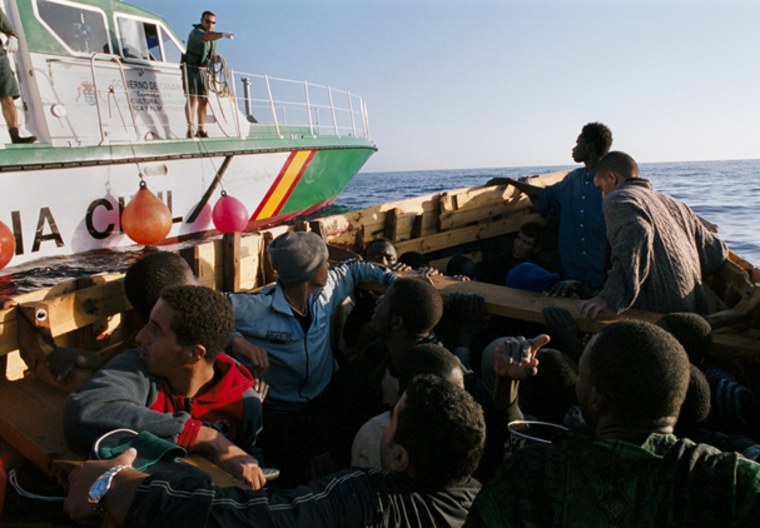The job markets of a booming European Union, now the largest economy in the world, have fueled a perilous, high-dollar traffic in legal and illegal migrants from Africa and Eastern Europe, and few who make the journey escape without scars.
In this series, MSNBC.com traces some of the stories: the boatloads of terrified Africans who arrive in the Mediterranean outpost of Malta, only to find they are stuck in a no-man’s land; the stark depopulation of the former Soviet republic of Latvia as citizens flock to the Western Europe; and the extraordinary personal journey of Kingsley, a young man who left Cameroon with his parents’ meager savings to find a new life, and economic salvation, in Europe.
The economic underpinnings of migration to Europe are similar to those that spur thousands of illegal immigrants to head to the United States annually. The response, too, has been similar; immigration regularly tops polls as the single biggest issue of concern for Europeans.
According to the United Nations, population growth in developing countries is nearly six times what it is in the developed world, fueling a flow of migrants from underdeveloped states to countries with stronger, stable economies.
More than ever that means the European Union. The 27-state EU, with a population of more than 490 million, is even larger than the United States. The EU’s GDP of nearly $14 trillion makes it the world’s largest economic bloc — and a magnet for job-seekers.
Most of the world’s international migrants — 64 million — reside in Europe, compared to 45 million in the United States and Canada.
The eye-popping demographic shifts can be seen from the streets of Dublin to the trendy outdoor cafes on Las Ramblas in Barcelona. In Ireland, foreign-born nationals now make up 10 percent of the population; in Spain, the figure is around 11 percent.
Meantime, British government statistics show that around 600,000 Eastern Europeans have arrived here in the past three years alone — far higher than the government’s pre-2004 estimate of 15,000 new arrivals per year.
Professor John Salt, a migration expert at University College London, describes this shift as “probably the largest single wave of immigration in the history of the British Isles in absolute terms.”
Two paths
The migration story has two broad threads. The world’s poorest and most conflict-ridden continent, Africa, sits a leaky boat ride away from Europe’s southern coastline. The trafficking of impoverished immigrants has mushroomed into a multibillion-dollar business.
Meantime, in 2004, the addition of eight ex-communist East European countries to the EU threw rich and poor nations together into one borderless entity. The move sparked a wave of legal migration westward, as the well-educated (but underpaid) managers and unskilled laborers sought higher wages and a brighter economic future.
Many advocates see a huge benefit to European economies from the legal and illegal migration.
A study by Ernst and Young estimated that new foreign workers to Britain would contribute around $8 billion to GDP and around $2.5 billion in tax revenue in fiscal year 2007-8.
But the rising tides of migrants, especially Africans and Muslims, has sparked an outcry in many European cities. The pope has suggested the addition of mostly-Muslim Turkey to the EU would be a mistake, while right-wing politicians have gained traction by reminding voters of the dangers posed by homegrown Islamic terrorism.
But beneath the numbers and politics are the ordinary people — Kingsley and Warsame, Laima and Olga, Ahmed and Robert — ensnared in events bigger than themselves. In Frontier: Europe, MSNBC.com brings you the human stories inside the numbers.
